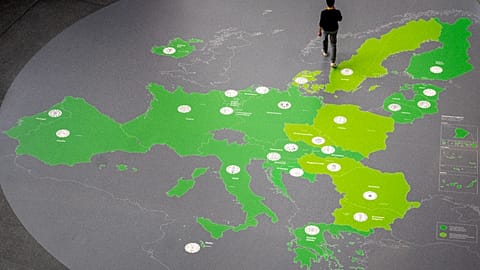Perceptions of tax fairness are generally higher in Nordic and Western European countries, while they tend to be lower in Eastern Europe. Experts attribute this gap to the quality of public services and the tax system’s capacity to redistribute wealth.
Taxes are an important way for governments to pay for public services like healthcare and education.
 ADVERTISEMENT
ADVERTISEMENT
 ADVERTISEMENT
ADVERTISEMENT
In 2023, the total taxes collected by all EU governments made up about 40% of the total value of goods and services produced, known as the tax-to-GDP ratio.
Yet despite the pivotal role of taxes, around one in four people in the EU believe that citizens in their country do "not at all" pay taxes in proportion to their income or wealth.
But how do views on tax fairness differ across Europe? A 2025 Eurobarometer study, which gathered responses from more than 25,000 people, asked citizens across the EU: "Do people pay taxes in proportion to their income and wealth in your country?”
Taxes are paid ‘to a large extent’ in line with wealth
Across the EU, one in five respondents said that this is the case ‘to a large extent’. The proportion of people who responded in this way ranges from just 8% in Latvia to 38% in Finland.
At least three in ten people in Luxembourg (36%), Denmark (32%), Austria (32%), Malta (31%), Germany (31%), and Greece (30%) also believe that people in their countries pay taxes ‘to a large extent’ in proportion to their income and wealth.
On the other hand, Lithuania, Poland, and Czechia (each 9%) are very close to Latvia, with few people responding to the question in this way.
Among the EU’s larger economies, Italy shows the lowest share for this view, at 12%. The perception is also below the EU average in Spain (17%) and France (19%).
Taxes are paid ‘to some extent’ in line with wealth
About half of respondents in the EU (51%) felt that people pay taxes ‘to some extent’ in proportion to their income and wealth. This share ranges from 33% in Hungary and Croatia to 59% in Cyprus.
Most countries fall between 45% and 55%, meaning this answer is the most common in 23 out of 27 EU countries. The exceptions are Hungary, Croatia, Estonia, and Bulgaria, where the ‘not at all’ response is higher than ‘to some extent’.
Four countries stand out for strong ‘not at all’ responses
Around one in four people in the EU (24%) believe that citizens in their country do ‘not at all’ pay taxes fairly in proportion to their income and wealth. In four countries, almost half of respondents share this view: Hungary (50%), Croatia (48%), Estonia (47%), and Bulgaria (46%).
The next highest is Slovakia (38%), showing that these four stand out as an outlier group. Beyond them, more than three in ten people in Latvia and Lithuania (both 36%), Poland (33%), Portugal, Slovenia, and Czechia (each 32%) also feel that taxes are not collected fairly, as citizens do ‘not at all’ pay according to their income and wealth.
Italy and Spain are close to this level as well, both at 39%.
In contrast, the two Nordic countries, Denmark (7%) and Finland (10%), record the lowest ‘not at all’ perception, both below 10%.
These results indicate clear geographical trends in how people perceive tax fairness. In general, Nordic and Western European countries express more positive views, while Southern European nations are more divided. In contrast, Eastern European EU members tend to see their tax systems as less fair.
In the EU, 5% of respondents said they do not know, while the share of unsure answers reaches 9% in some countries.
What shapes people’s views on tax fairness?
“Where citizens perceive procedures as transparent and rules as applied equally to all, tax morale and voluntary compliance tend to be strong,” said economic psychology professor Erick Kirchler from the University of Vienna.
He noted that in countries such as Denmark and Finland, which consistently rank among the global leaders in governance and integrity, citizens report a particularly high perception of fairness in the tax system.
“In these contexts, taxpayers experience a clear ‘value for money’. High-quality public services — such as childcare, health care, education, and security — make the return on taxes visible,” he added.
Kirchler pointed out that lower institutional trust and weaker administrative capacity, as found in parts of Eastern and Southern Europe, often undermine these perceptions.
Finland vs. Poland
Dr Fabian Kalleitner from Ludwig Maximilian University of Munich underlined that people in Northern European countries are generally more satisfied with the distribution of income after redistribution than people in Southern and Eastern European countries.
“This is not only because income differences between the top and bottom are smaller—although they are also relatively low in many Eastern European countries—but also because the income floor is higher, even after accounting for differences in purchasing power,” he said.
“In other words, the poor in Finland and Denmark simply have higher incomes than the poor in Poland or Czechia.”
Kalleitner also highlighted the ‘actual redistributive power of taxes,’ referring to a government’s ability to use its tax system to influence the distribution of income and wealth.
“Countries with low tax redistribution, such as Estonia, Latvia, or Hungary, show lower levels of [fairness] agreement than high-redistribution countries such as Austria, Finland, or Denmark,” he said.
Role of tax complexity
Professor Caren Sureth-Sloane from Paderborn University emphasised the role of tax complexity.
She noted that tax systems in Northern European countries are generally seen as less complex, and this is often linked to higher levels of trust in both the government and the tax system.
“Nordic countries offer their citizens extensive information on tax payments of individuals, they are very transparent in this respect,” she said.
Dr Sabina Kołodziej, from Kozminski University, added: “High perceptions of tax fairness in Nordic countries can be attributed to strong institutional quality and high levels of societal trust. These factors foster voluntary compliance and enable effective redistribution, resulting in more equal societies with low levels of poverty and inequality.”

















